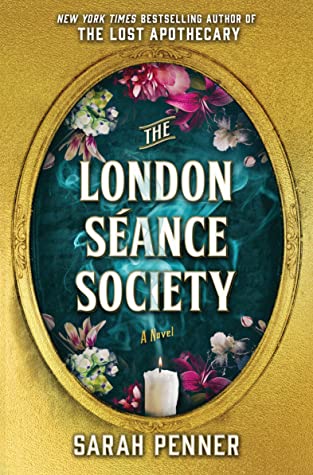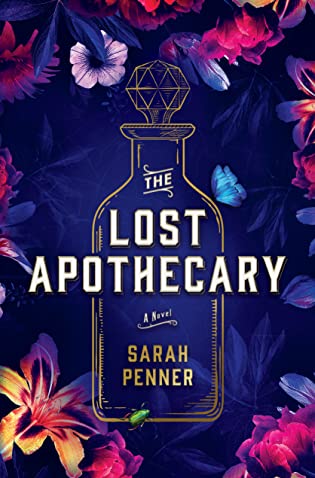 The London Séance Society by Sarah Penner
The London Séance Society by Sarah Penner Format: eARC
Source: supplied by publisher via Edelweiss
Formats available: hardcover, paperback, ebook, audiobook
Genres: historical fiction, historical mystery, magical realism
Pages: 352
Published by Park Row on March 7, 2023
Purchasing Info: Author's Website, Publisher's Website, Amazon, Barnes & Noble, Kobo, Bookshop.org, Better World Books
Goodreads
From the author of the sensational bestseller The Lost Apothecary comes a spellbinding tale about two daring women who hunt for truth and justice in the perilous art of conjuring the dead.
1873. At an abandoned château on the outskirts of Paris, a dark séance is about to take place, led by acclaimed spiritualist Vaudeline D’Allaire. Known worldwide for her talent in conjuring the spirits of murder victims to ascertain the identities of the people who killed them, she is highly sought after by widows and investigators alike.
Lenna Wickes has come to Paris to find answers about her sister’s death, but to do so, she must embrace the unknown and overcome her own logic-driven bias against the occult. When Vaudeline is beckoned to England to solve a high-profile murder, Lenna accompanies her as an understudy. But as the women team up with the powerful men of London’s exclusive Séance Society to solve the mystery, they begin to suspect that they are not merely out to solve a crime, but perhaps entangled in one themselves…
My Review:
Whether one believes that death is merely the gateway to the next great adventure, or that one is ascends to heaven or descends to hell, or that it is an end to all things – or holds some other belief altogether – we don’t actually KNOW in the empirical, scientific, provable and replicable sense. All that is certain is that death is inevitable – even more so than taxes in spite of the cliché.
The desire to know may be universal. When this story takes place in the 1870s the belief that it was possible to communicate with the dead, to reach behind that veil and either send or receive a message from those who had left us behind, was at its height. And also, as this book tells, its all too human, fallible and corruptible depths.
In other words, spiritualism was a very big – and very profitable deal in the 1870s. Victoria and the Victorian Era she gave her name to practically fetishized death. In the Re-United States there were few if any households who had not lost a friend or a loved one in the recent war. Plenty of people were looking for comfort or solace or simply closure.
No matter how prevalent beliefs in the spirit world may have been in the 1870s, later investigations proved that most of what was purported to be proof was actually proof of fraud and the gullibility of grieving people to believe what they needed to believe to get through their grief – or not, as the case might be.
But what if some of those beliefs were not misplaced? What if some mediums really could reach beyond the veil to bring true messages from the dead?
Lenna Wickes begins the story only believing in things she can see and hear and touch. But in her desperation to discover the truth about her sister’s murder, she turns to noted spiritualist Vaudeline D’Allaire to learn the tricks of her trade in the hopes of learning that truth – or at least of expiating her own guilt that their last conversation was yet another in an endless series of arguments.
What she finds instead is a mystery wrapped in an enigma, and a fish that has rotted from the head down and threatens to engulf her and the woman she loves. Unless it blows up in her face.
 Escape Rating A: I picked up The London Séance Society because I enjoyed the author’s debut novel, The Lost Apothecary, and wanted to see if her second book lived up to the first. Which it not only did, but was just that little bit better.
Escape Rating A: I picked up The London Séance Society because I enjoyed the author’s debut novel, The Lost Apothecary, and wanted to see if her second book lived up to the first. Which it not only did, but was just that little bit better.
Her previous novel combined “a bit of a time slip story with historical fiction, a soupcon of magical realism and just a touch of mystery.” The London Séance Society skipped the timeslip, but told an even more fascinating tale of historical fiction with a much larger portion of magical realism and a heaping helping of mystery.
The magical realism is the part of the story that is both lampshaded and played straight at the same time – which keeps both the reader and the protagonist guessing from beginning to end.
Lenna Wickes represents the 21st century reader who does not believe in anything she can’t see or touch. Before her sister’s death, she collected fossils. But her sister Evie, who seemed to be a firm believer in spiritualism, claimed that those fossils were a kind of proof that it was possible to reach beyond the veil. That those preserved insects in amber, or the impressions of long-dead leaves and creatures in rock was just another way of reaching beyond death.
The sisters – as sisters do – strongly disagreed and were in disagreement when Evie was murdered.
Lenna dives into the world of spiritualism in an attempt to either communicate with her sister or figure out why she died, or both. She doesn’t believe, but she does feel that there might be something there. It’s also entirely possible that what she feels is considerably more related to her teacher than what she is being taught.
Whether Lenna believes or not, whether Vaudeline D’Allaire is a true medium or a fraud, it’s clear from the beginning that there is something rotten at The London Séance Society, a rich and powerful gentlemen’s club that prides itself on providing séances and other proofs of spiritualism.
Evie Wickes and the Society’s President were murdered on the same night – but not in the same place. It makes no sense to either Lenna or Vaudeline that the deaths could possibly be related. Until coincidences start piling up, and it becomes clear that someone high up in the Society was involved in something dirty that needed to be covered up. By any means necessary.
What made the story so compelling was the way that at first it seems like the identity of the rotter is obvious, to the point where one starts to believe one has it all figured out long before Lenna reaches that point. But there’s a niggle that it can’t possibly be that simple, and that’s what keeps one – or at least kept me – turning pages well into the night.
Because the more Lenna digs into the Society, the more dirt comes up, and the more the obvious conclusion looks to be hiding another, more sinister conclusion that is less obvious and even more unthinkable than the first terrible possibility. To the point where just when you think you can see the final twist coming – the story has yet one more turn to surprise you with.
The Lost Apothecary was very, very good. The London Séance Society is even better. I can’t wait to see what this author comes up with next!


 The Lost Apothecary by
The Lost Apothecary by 